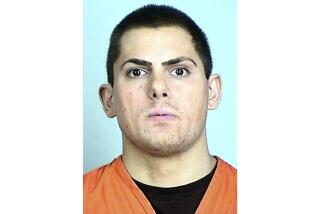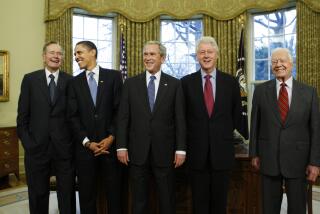Obama to be in background of trial
- Share via
CHICAGO — Starting even before Barack Obama graduated from law school, his career as a lawyer and politician was nurtured by a Chicago businessman named Tony Rezko.
Now Obama avoids discussing Rezko, and his former backer isn’t in a position to speak publicly. The once-dapper businessman appeared in federal court the other day, unshaven, wearing an orange jumpsuit and leg irons. On Tuesday, Obama hopes to beat Hillary Rodham Clinton in the Texas and Ohio Democratic primaries, wins that could ensure his nomination for the highest office in the land. On that same day, prosecutors and defense lawyers are expected to be in a Chicago courtroom in their second day of selecting a jury to decide Rezko’s fate.
In this city’s latest high-profile corruption case, Antoin “Tony” Rezko is accused of extortion for allegedly peddling influence in Democratic Gov. Rod Blagojevich’s administration. The trial could last through June, over four months in the presidential campaign. Obama aides say they know Rezko’s trial will be a distraction but do not believe it will have a serious effect.
“Rezko has been a friend and supporter [of Obama’s], as he has been with many politicians,” Obama’s chief strategist, David Axelrod, has told The Times. “It’s always easy in retrospect to say this or that should been a warning flag.”
Blagojevich, believed to be a subject of the investigation though he is not charged, denies wrongdoing. Obama is not implicated. But U.S. District Judge Amy J. St. Eve made it likely that Obama’s name would come up in court when she ruled that prosecutors could introduce evidence that Rezko used “straw donors” to give to politicians, apparently including Obama.
The relationship between Obama and Rezko was based on more than money.
They met in 1990 when Rezko, then starting a low-income housing development business, noticed a news article about Obama being elected the first African American president of the Harvard Law Review. One of Rezko’s partners called Obama on Rezko’s behalf and offered him a job, according to a Chicago Sun-Times account last year.
Obama declined. But their paths soon would cross -- and Rezko would become an issue in the presidential campaign.
The Syrian-born Rezko, 52, moved to the United States after graduating from high school. He earned a degree in engineering and began developing real estate. Over time, Rezko’s entrepreneurial appetites grew to include a 62-acre development in downtown Chicago, a contract to build a power plant in Iraq, and chains of pizza and Chinese restaurants. He and his wife, Rita, gained the trappings of wealth: a $74,000 diamond ring, a $22,000 mink coat, a $35,000 watch. But his housing projects -- many of which were in Obama’s state Senate district -- deteriorated.
In a January debate, Clinton jabbed Obama over his legal representation of Rezko “in his slum landlord business in inner-city Chicago.”
Obama shook his head and said that the characterization was not accurate. “I was an associate at a law firm that represented a church group that had partnered with this individual to do a project, and I did about five hours’ worth of work on this joint project. That’s what she’s referring to.”
Though Obama did represent a church, he also represented the nonprofit Woodlawn Preservation & Investment Corp., founded by Bishop Arthur Brazier of the Apostolic Church of God. In an interview, Brazier said his role as a Woodlawn director was separate from his work at the church.
Woodlawn was partners with Rezko in four low-income housing projects with hundreds of units. In at least one instance, in 1994, Obama represented Woodlawn on a troubled project it later shared with Rezko. The city of Chicago sued, alleging Woodlawn failed to provide tenants with heat in the winter, and Obama represented the landlord in court.
Obama, meanwhile, was entering politics, announcing his run for the Illinois Senate in 1995. Rezko was there to help, donating the first $2,000 to Obama in July 1995.
Judson Miner, head of Obama’s old law firm, Brazier and others say there was no indication in the 1990s and beginning of this decade that Rezko’s practices were questionable.
In 2003 and 2004, Obama’s relationship with Rezko grew particularly strong. Obama was a junior state senator who decided to mount an improbable campaign for the U.S. Senate. Aides to that campaign recall that to convince pundits he was serious, Obama aimed to amass $1 million in campaign donations by June 2003.
Rezko stepped up, feting Obama at a fundraiser at his suburban Chicago mansion in mid-2003. Obama reached his fundraising goal, ending June 2003 with $1.07 million in the bank.
Between the first $2,000 state Senate donation and the 2004 U.S. Senate race, Rezko raised at least $200,000 for him, a Times analysis shows. Obama, seeking to distance himself from his patron, has donated $160,000 in Rezko-related contributions to charity.
In court documents, prosecutors suggest Rezko skirted the law to help Obama, albeit without Obama’s knowledge. Having donated the maximum allowed by federal law, Rezko allegedly gave money to at least two associates to make separate $10,000 contributions to Obama, one in December 2003 and another in March 2004.
By then, questions were being raised about Rezko.
When Blagojevich took the oath of office as governor in 2003, Rezko became integral to his administration, taking a hand in securing state posts for numerous individuals. At least three who were part of Obama’s political operation are on a list of individuals who got interviews with the new administration or were given jobs, documents filed in the criminal case show.
Rezko’s role in the Blagojevich administration drew the attention of auditors and legislators, including Democratic state Rep. Jack D. Franks. In an interview, Franks said he encouraged Obama to run for president, and he praised his intellect. But Franks has endorsed Clinton and believes Obama’s relationship with Rezko raises questions about his judgment.
“It wasn’t a secret that Tony Rezko was a very connected moneyman in the Blagojevich administration who was coming under increased scrutiny,” Franks said.
Soon after being sworn into the U.S. Senate in 2005, Obama was collecting royalties from a best-selling book and preparing to buy a family home, a stately red brick mansion in the Kenwood neighborhood near the University of Chicago.
Rezko, by now linked in news stories to a federal investigation, was there to help. At Obama’s invitation, Rezko and Obama spent 15 to 30 minutes walking around the corner lot, Obama’s aides said recently.
Obama subsequently bought the home for $1.65 million, $300,000 below the original asking price. The sellers owned a vacant lot next the Obama property and needed to sell it to close the deal.
Federal authorities were investigating Rezko, and his financial situation was deteriorating. Business associates and friends were suing for business deals gone awry. But Rezko stepped forward, paying the $625,000 asking price for the lot. He put the land in Rita Rezko’s name, apparently to protect the asset from creditors.
By the time of Rezko’s October 2006 indictment, the mortgage was past due and there was an unpaid $18,500 tax bill. The purchase became public soon after. As Obama prepared to run for president, the senator told Chicago reporters that his dealings were “boneheaded” and raised the appearance of favoritism.
As Rezko’s trial opens today with jury selection, Obama will be barnstorming in Ohio or Texas.
Although the senator won’t be the focus of testimony, pretrial filings make clear that the nature of Illinois politics will be at the forefront. Much of what prosecutors allege took place occurred when Obama was in the Illinois state Senate. As Judge St. Eve said last week, “There are going to be a lot of names in this trial.”
--
More to Read
Sign up for Essential California
The most important California stories and recommendations in your inbox every morning.
You may occasionally receive promotional content from the Los Angeles Times.










